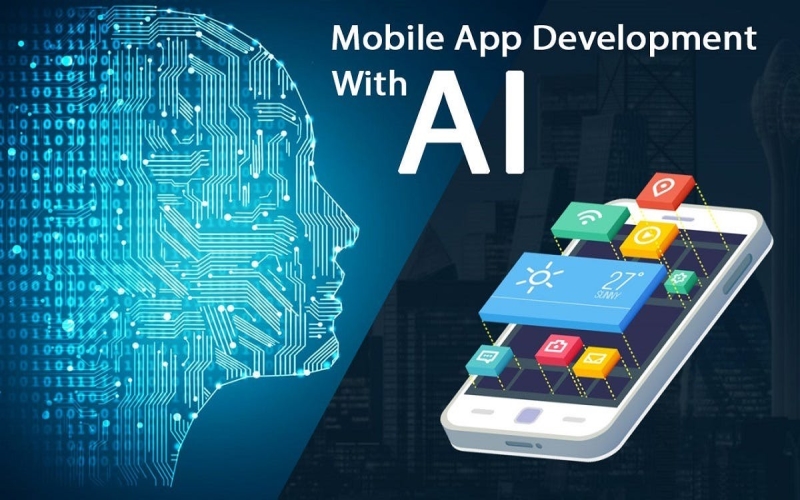In this ever-evolving digital world, artificial intelligence services or AI is at the forefront of innovation. From virtual assistants like Siri and Alexa to ride-hailing services like Uber, AI has made the impossible possible. Nowhere is this more evident than in the realm of Mobile App Development, where AI is playing a transformative role.
A Shift Toward AI-Driven App Development
Mobile apps have become an integral part of our lives, with an average consumer spending over 3 hours each day on their mobile device. This growing dependency on mobile apps is prompting developers to leverage AI to create more immersive and personalized user experiences.
AI in Mobile App Development is essentially about embedding intelligent behavior to make apps responsive and adaptive. For instance, AI algorithms can analyze user actions within an app and, then, modify the app’s behavior accordingly.
The e-commerce giant, Amazon, is a prime example of how AI is transforming mobile apps. All the personalized product recommendations that we receive based on our browsing history are made possible by AI algorithms.
Waze, a community-driven GPS app, also leverages AI. It’s AI engine processes data from millions of drivers to provide the fastest routes and real-time traffic updates. AI’s role, therefore, cannot be overlooked when it comes to enhancing the usability and functionality of mobile apps.
Addressing Concerns
With AI’s prolific intrusion into our lives, concerns about privacy and data security are inevitable. How AI-powered apps handle sensitive user information is a matter of significant concern.
However, developers and tech giants are constantly working to ensure AI ethics, transparency, and security. The introduction of regulations like the GDPR (General Data Protection Regulation) in the EU is a testimony to the efforts being made towards securing user data. Advances in AI are also geared towards making AI algorithms explainable and transparent, a field known as XAI (Explainable AI).
Efficiency and Automation
AI also plays a crucial role in the app development process itself. AI algorithms can automate numerous tasks, ranging from debugging to UI design. This not only expedites the development process but also ensures higher accuracy.
In fact, according to Gartner, “By 2022, at least 40% of new application development projects will have AI co-developers on their team.”
Consider this: AI can identify design inconsistencies that a human may overlook during the app testing phase. This level of precision is improving the quality of mobile apps and enhancing user experiences.
Going Beyond Conventional Boundaries
AI is enabling mobile apps to go beyond conventional features. The integration of AI with technologies like AR (Augmented Reality) and VR (Virtual Reality) is ushering in innovative possibilities.
The IKEA Place app, which allows users to see how furniture would look in their home using AR, is one such example. By integrating AI, the process of selecting furniture could be made even more seamless by providing recommendations based on user preferences.
Unleashing the Power of AI in Mobile App Development
While the initial introduction has touched upon the transformative role of artificial intelligence services in mobile app development and some benefits of its integration, let’s look more deeply into these areas, including personalization, voice recognition, automation, and more.
Emphasizing on Personalization
One of the most significant advantages of using AI in mobile apps is providing personalized content to users. AI’s ability to learn from user behavior, preferences, and patterns can be utilized to show tailor-made suggestions, pushing user engagement to new heights.
Music streaming services like Spotify and Pandora tdhjvtnm leverage this aspect of AI to curate personalized playlists based on user listening habits and song choices. Similarly, news apps use AI to curate news feeds based on the past reading habits of users, thus ensuring relevancy and better user retention.
Voice Recognition and AI
Voice-enabled AI technologies have opened up a new avenue of possibilities in mobile apps. Voice assistants like Siri, Google Assistant, or Alexa are powered by AI technologies, which help in recognizing and interpreting human voice commands.
These AI-based voice recognition technologies enhance the convenience of using apps, especially when users are driving or multitasking. Many mobile apps, from banking to food ordering apps, have implemented voice-based search or voice command features to enhance user experience.
AI-Powered Predictive Analysis
Artificial Intelligence also enables predictive analysis that can be used to predict future user behavior, leading to more strategically designed interactions. This helps businesses to anticipate user needs, enriching the user’s journey within the app. Predictive analysis can also be applied to counteract customer churn by identifying patterns that signal a user’s intention to discontinue using the app.
Automation in App Development
Automation of the app development process through AI can lead to significant time and cost savings. This can include automated coding, whereby AI systems can learn coding rules and start coding on their own, saving time and effort for developers. Furthermore, AI can be used to conduct automated app testing, identifying issues with greater accuracy and speed than a human tester.
AI Enhancing Security
AI also plays an important role in enhancing the security of apps. AI algorithms can detect and learn from patterns of fraudulent activities or threats and initiate preventive measures. For instance, biometric logins, such as facial or fingerprint recognition, make use of AI and offer much better security solutions than traditional passwords.
Conclusion
The role of AI in mobile app development, in many ways, is revolutionizing the industry. By enabling personalization, voice recognition, predictive analytics, automation, and enhanced security, AI is significantly elevating the user experience.
The significance of AI in the app development arena will continue to grow as user expectations for seamless and personalized experiences remain high. Hence, harnessing the power of AI will give businesses a competitive edge in the dynamic and growing mobile app market.

